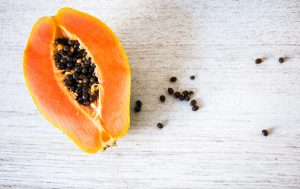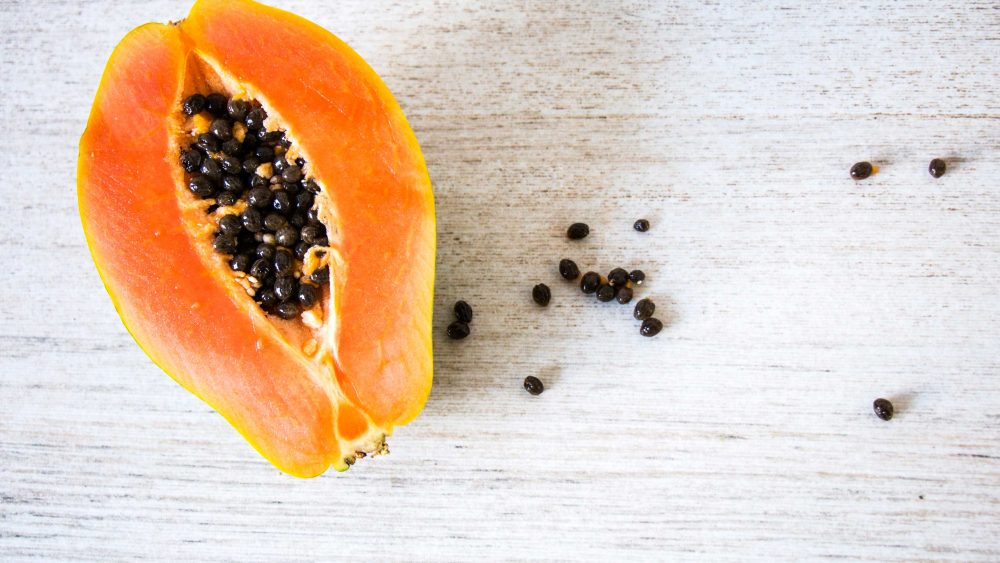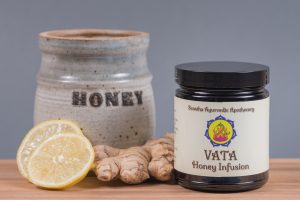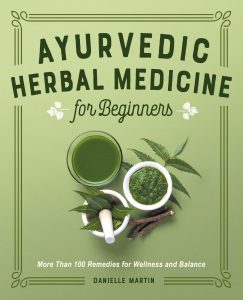 Keeping the colon flowing freely is an essential goal for optimal health in the world of Ayurveda. In fact, Dr Vasant Lad even goes as far to say that 80% of all disease can be prevented through a healthy and clear colon. Unfortunately with our Vata deranged society, constipation whether mild or severe is a very real issue for many individuals.
Keeping the colon flowing freely is an essential goal for optimal health in the world of Ayurveda. In fact, Dr Vasant Lad even goes as far to say that 80% of all disease can be prevented through a healthy and clear colon. Unfortunately with our Vata deranged society, constipation whether mild or severe is a very real issue for many individuals.
What is considered constipation?
In an ideal world, one should be having an average of 1-3 bowel movements each and every day, with a feeling of fulfillment afterward. There should be no straining and the stool should be well-formed, yet soft (“like a ripe banana”). Elimination should take place at fairly consistent times with the first movement occurring upon awakening.
Click here to read our article, An Ayurvedic Perspective on Pooping (chart included!).
Alternatively, various levels of constipation can be seen in many forms depending on the individual. One may be having 3 movements a day, but only with excessive pain and strain, very little yield, and therefore no satisfaction after passing. Another individual may have fulfilling movements but goes 1-3 days between each one. Even frequently skipping one day is frowned upon in Ayurvedic medicine and needs to be addressed.
What are the common causes of constipation according to Ayurveda?
Since the colon is the home of Vata dosha and constipation possesses the qualities of hard, dry, rough, and constricted, it is said that the main overall cause is high Vata (air and space element) in the colon. The specific causes of the high Vata will be varied for each individual, but here is a list of some of the most common.
Common Causes of Constipation
- Vata-provoking diet
- Poor dietary habits (excessive junk food, take out, processed foods, overeating, etc)
- Vata-provoking lifestyle
- Regular intake of improper food combinations
- Intake of intolerable or allergenic foods (some common culprits include wheat, gluten, dairy, soy, nuts, and eggs to name a few)
- Leftovers or stale food
- Dehydration
- Anxiety
- Excessive fear and worry
- Lack of a consistent daily routine
- Irregular meal schedule
- Irregular or improper sleep routine
- Lack of sleep or insomnia
- High stress
- Suppression of natural urges
- Travel
- Obstruction due to toxins or congestion in the colon
- Imbalance of gut flora (dysbiosis)
- Parasites
Before moving on to the remedies, I must state that in order to truly eliminate constipation, the first line of treatment must be to remove the cause(s). This will take some personal investigation and possibly some trial and error. However, without removing the cause(s), these remedies listed below will simply act as a bandaid without ever treating the underlying issue.
11 Ayurvedic Remedies for Constipation
1. Follow a strict Vata-pacifying diet.
When dealing with any issue in the GI tract, it will be essential to make the proper dietary changes that are needed to bring balance back to the digestive system. In the case of constipation, one may be eating a perfectly healthy diet, but these healthy foods may be Vata-provoking (e.g. salads, raw juices, raw veggies, dried fruits, etc). Therefore no matter what your current diet is, it is recommended to follow an overall Vata-reducing diet plan. Here are some of the main guidelines to follow.
- Take in mainly simple, easy-to-digest meals such as soup, kitchari, dal, basmati rice, white quinoa, steamed veggies, broths, stews, crock-pot meals, etc)
- Favor warm, mushy, and well-spiced foods
- Avoid cold, raw, rough, dry foods and drinks (e.g. raw veggies, cold smoothies, raw juice, crackers, toast, dry cereal, protein bars, granola bars, etc)
- Limit heavy, hard-to-digest foods such as meat, dairy, and most beans (mung beans and red lentils are recommended, however)
- Eat on a consistent meal routine at proper times (i.e. 6-7 am breakfast, 11 am-1 pm lunch, 5-7 pm dinner)
- Follow the proper food combinations (get the chart here!)
Click here to read a detailed list of the general Vata dietary guidelines.
Click here to discover the Vata food chart.
2. Follow a Vata-balancing lifestyle.
When dealing with any Vata imbalance, it will be beneficial to follow some basic Vata-reducing lifestyle practices. This will not only help treat constipation, but will also help any other underlying Vata imbalance occurring such as anxiety, sleep issues, and a restless mind. Here are some Vata-reducing essentials to incorporate into your daily lifestyle.
- Follow a healthy, Vata-specific sleep schedule (i.e. asleep by 9-10 pm, awake by 6-7 am)
- Follow a fairly consistent daily routine (click here for our Ayurvedic daily routine chart)
- Perform an oil massage with Vata Oil before bed 1-3 nights each week
- Take a warm ginger bath 1-3 nights a week (click here for our ginger bath recipe)
- Perform gentle or restorative Yoga 1-3 times a week
- Practice deep belly breathing, 3 times daily for 5-10 minutes per session
Click here for more ideas on how to balance Vata.
3. Drink hot water upon awakening and consistently between meals (avoid cold or iced water or beverages!).
Drinking hot water first thing in the morning and steadily between meals will be beneficial in multiple ways. This practice will reduce any potential dehydration that may be contributing to the constipation. For this, one should make sure to drink a total of 8-10 cups daily of warm to hot water (tea and juices do not count). The hot water acts to flush out the GI tract, open up the vital channels, remove obstruction and aid in healthy elimination.
Directions: Begin each morning with 16 ounces of hot water. From here, make sure to drink at least 16 ounces of warm-hot water between each meal while avoiding drinking any liquids during food intake or directly after a meal.
4. Drink this Papaya Smoothie recipe each morning.
Although cold raw foods should be generally avoided during times of constipation, this particular recipe is made with warm water, warming spices and contains specific ingredients that will help promote elimination. Papaya provides powerful digestive enzymes and is very effective for treating constipation, even in severe cases.
Simple Papaya Smoothie Recipe for Constipation
Ingredients
- 1/2 of a medium papaya
- 1/2 cup of warm water
- Thin slice of fresh ginger
- 1/8 tsp of cardamom
- 1/4 tsp of cinnamon
- 1 tsp of flax or coconut oil
- 1 tsp of honey
Directions: Blend all of these ingredients together at high speed for 2-3 minutes. This smoothie should be taken first thing each morning after the 16 ounces of hot water recommended above. No food should be eaten for at least one hour after.
Or try my even tastier and more effective “Papaya Poop Smoothie”!
5. Take 1 tsp of soaked chia seeds each morning.
Although chia seeds can be dehydrating (and therefore provoke Vata and constipation) when taken in the wrong context, they can also lubricate the colon and promote healthy elimination when taken properly. Taking a small number of soaked chia seeds each morning is great for your daily soluble fiber intake which is known to form a gel-like substance in the GI tract, lubricating the intestinal wall and aiding in healthy elimination.
Directions: Soak 1 tsp of chia seeds in 1 cup of water overnight. Take this first thing each morning followed by the 16 ounces of warm-hot water recommended in #3 above. NOTE: When taking chia seeds regularly it is even more crucial to drink enough water each day as they can otherwise lead to dehydration.
6. Take Haritaki, ghee, and honey in warm milk before bed.
Haritaki is one of the three herbs in Triphala and is specifically taken for reducing Vata and treating constipation (among many other health benefits). Taking this herb in warm milk with ghee each night will enhance the properties of the Haritaki making it more effective for promoting healthy elimination the following morning.
Directions: Heat 1/2 cup of milk to just below a boil and then take the pan off of the heat. Add in 1/2-1 tsp of Haritaki and 1 tsp of ghee. Stir well until the ingredients are completely blended. Allow the milk mixture to cool slightly (108 degrees or less) and then stir in 1 tsp of honey. Take this each night 15-30 minutes before bed.
7. Take 1 tsp of Triphala Churna each night before bed.
Triphala Churna is the classical heal-all formula in Ayurvedic medicine. It is tri-doshic by nature and can be taken by any body type (generally speaking). All three herbs have a mild laxative quality and together are one of the most effective formulas for promoting healthy daily elimination without creating dependency (and therefore can be taken long-term).
Directions: Steep 1 tsp of Triphala Churna in 1/2-1 cup of warm water for 5 minutes. Stir well and drink 15-30 minutes before bed each night.
Purchase my hand-blended Triphala Churna here.
8. Take a spoonful of Vata Honey Infusion before each meal.
Vata Honey Infusion is a digestive aid that has been formulated specifically for Vata digestive issues including gas, bloating, and constipation. Taking this remedy before each meal helps to increase the Agni or digestive fire, process and assimilate food properly and promote healthy, daily elimination.
Directions: Take a small spoonful (about 1 tsp) of the Vata Honey Infusion before each meal. Follow with a few sips of warm water. Consistency is needed for noticeable results. For more severe issues take this as recommended here while following the nighttime Triphala and Vata Honey remedy in #9 below.
Purchase my Vata Honey Infusion here.
9. Take Triphala Churna in Vata Honey before bed each night.
For more severe constipation issues, blending these two remedies together and taking them before bed each night will help to enhance the Vata-reducing, laxative-promoting qualities of the herbs and help to create balance in the GI tract. As an added bonus the Vata Honey helps to reduce the unpleasant taste of the Triphala Churna.
Directions: Blend 1 Tbsp of Vata Honey with 1 tsp of Triphala Churna to make a soupy paste. Take this each night before bed followed by 1/2 cup of warm water. For more sever constipation, this dosage can be repeated in the morning directly before taking the warm-hot water that is recommended in #3 above.
**If needed the Vata Honey can be taken on its own before meals (see #8 above) while also following this remedy.
Purchase my Vata Honey Infusion here.
Purchase my hand-blended Triphala Churna here.
10. Perform weekly Dashamul Tea Basti (herbal enema).
When it comes to treating Vata in the colon, there is not much more effective and direct treatment than performing an enema using Dashamul Tea (known as Dashamul Tea Basti). Applying this enema treatment not only aids in the direct flushing of the colon but utilizes this “10 roots” formula that is specific for removing constipation and reducing the overall Vata imbalance.
Directions: Perform the Dashamul tea basti on an empty stomach either first thing in the morning or before bed. Apply these 1 to 3 days each week until constipation has subsided. Avoid excessive use, as this can create dependency over time. To prevent further constipation, this herbal enema can be performed up to one time weekly, bi-weekly or monthly long-term.
11. Take 1 Tbsp of organic, food-grade Castor Oil in ginger tea before bed.
WORD OF CAUTION: Castor oil should only be taken using a very high-quality, organic castor oil and should be taken only under the guidance of a knowledgeable practitioner. Taking too much can lead to vomiting, nausea, or severe diarrhea, and taking this remedy for too long can lead to dependency.
With this being said, castor oil is one of the most powerful OTC purgatives when performing cleanses and can also be used (in the proper context) for clearing the colon when the constipation is due to congestion, toxins, or obstruction. Performing a quick flush while taking in a Vata-reducing diet and lifestyle, and utilizing a few of these herbal recommendations may be more effective in these cases.
Directions: Mix 1 Tbsp of castor oil blended with 1 cup of a warm ginger tea (get recipe here). Take this each night directly before bed for 2 to 3 nights in a row and then discontinue use completely. After the flushing is complete, switch to a less abrasive nightly treatment such as the Triphala Churna recommended above.
Conclusion
Although constipation comes in many different forms and variable causes, it will almost always involve high Vata in the colon. Therefore treating the Vata, while removing the specific cause(s) and taking the proper herbal remedies will undoubtedly promote balance in the system and lead to healthy daily elimination without strain, pain, or frustration. A healthy, clear colon is essential for optimal health and can indeed both prevent future disease and alleviate current disorders.
Try my handcrafted Vata Honey Infusion!





Hello, I have a question on #6. 6. It says take Haritaki, do you take that alone or do you actually take Triphala? I didn’t see where you could buy Haritaki alone.
Thanks
Hi Dana,
Thank you for your question! I was talking specifically on using Haritaki as the separate herb; however, if you are not able to find a high quality source, Triphala will be equally as beneficial. Haritaki is the main herb of the three for treating Vata, but Triphala as a formula is very effective for treating constipation and can be used in its place. Please let me know if you have any further questions!
Namaste,
Danielle
Hi Danielle thank you so much for this amazing post. I’m wondering what dosage of Dashamul you recommend for the basti and do you mix with water or oil and of what quantity?
Thank you 🙂
Alyce
Hi Alyce,
Thank you for your question! I generally recommend to use 1 to 2 tablespoons of the powdered Dashamul formula, per basti. You can make an infusion from this by adding it to 4 cups of boiling water, reduce the heat to a simmer, and letting the infusion boil down to only 2 cups of liquid. After this, strain the herbs out and let the infusion cool; then it is ready to apply!
You can use oil or ghee, but there are some contraindications, so this method is be better unless you are under the direct care of a practitioner.
Please let me know if you have any further questions!
Namaste,
Danielle
Amazing, this is super helpful, thankyou so much 🙂
Do you have an opinion on a product called ‘Nityam’ (contains 7 ingredients) including Triphala and
Caster oil. it seems to be powerful for constipation. I do not know how much caster oil it contains.
For me, 3/4 teaspoon of Triphala with a 1/12th of teaspoon of ‘Nityam’ works. Is it OK to use
long-term?
Hi Murty,
Thank you for your question! I am not familiar with Nityam, but I do know that castor oil does create dependency with longterm use. However, if you are only taking 1/12 of a teaspoon, then this very small dosage is likely safe for longterm use. Generally taking pure castor oil at 1/2 teaspoon or more daily is not recommended longterm, unless you are under the care of a knowledgeable practitioner.
Triphala is very safe and can be taken indefinitely throughout your life.
Many blessings!
Namaste,
Danielle
Dashamul Tea Basti is same as water basti . What ingredients like Dahamul powder or anything else. Thank you..
Hi Vinit,
Thank you for your question! Dashamul Tea Basti is administered using a Dashamul Tea Infusion. It is not the same as a water enema and is more powerful for treating Vata and constipation issues. Here is how to make the Dashamul Tea Infusion for Basti therapy:
1. Boil 4 cups of filtered water.
2. Reduce the heat to simmer and add 1 to 2 tablespoons of the Dashamula powder and cover leaving a crack in the lid to allow evaporation to occur.
3. Simmer on low heat until only 2 cups of liquid remain.
4. Using a cheesecloth or fine mesh strainer, strain the sediment out of the tea and place the remaining liquid in a large measuring cup or glass jar. *If too much sediment is left, the enema tube may clog.
5. Cool the strained tea until the temperature is lukewarm (about 98º). You should be able to place your pinky finger in this for an indefinite amount of time. It should neither be too hot nor too cold. This is very important!
6. Once the temperature is appropriate, add the tea to the enema bag and proceed as directed.
I hope this helps!
Namaste,
Danielle
Is triphila okay in pregnancy? I have used it for 10+ years to manage my constipation and anal fissure, now I am in lots of pain bc I’m told to now take it since being pregnant
Hi Jenna,
Thank you for your question! I am sorry you are experiencing this discomfort (as if pregnancy wasn’t uncomfortable enough already!).
It is generally recommended to avoid Triphala during pregnancy, although it is alright during the postpartum stage even if you are breastfeeding. There has not been enough studies on taking this formula during pregnancy to determine it to be safe. And with its powerful effect on Apana Vayu (the downward wind) it has the potential for stimulating the birthing process early.
You may want to try a more gentle option for now such as warm milk with 1/4 tsp licorice and 1 tsp ghee before bed, 1 to 2 tsp of psyllium husk (Sat Isabgol) in a cup of warm water, or eating ripe papaya daily (this worked well for me!). I even have a Papaya “Poop” smoothie you can try.
I hope this helps bring you some relief. Let me know if you have any further questions!
Namaste,
Danielle
Hello Danielle,
I’ve been a higher vata person throughout my life from what I read about and I’ve become a vata-kapha person now. Recently with the menopause, I’ve noticed that my constipation symptoms have worsened. I’m not able to empty my bowls and what comes out looks like a bunch of hard stones. Which of the above remedies (or anything else) will work for my situation?
Hi Asra,
Thank you for writing in! I am sorry to hear you are experiencing this uncomfortable issue. I would suggest following the Vata-soothing diet and lifestyle recommendations while also taking the Triphala Churna with Vata Honey (1 tsp each) in warm water before bed and again upon awakening. If this does not help, you can perform the Dashamul Basti (enema) one to three times weekly until the constipation resolves.
Let me know how it goes and if any questions come up along the way.
Take it slow and be well:)
Namaste,
Danielle